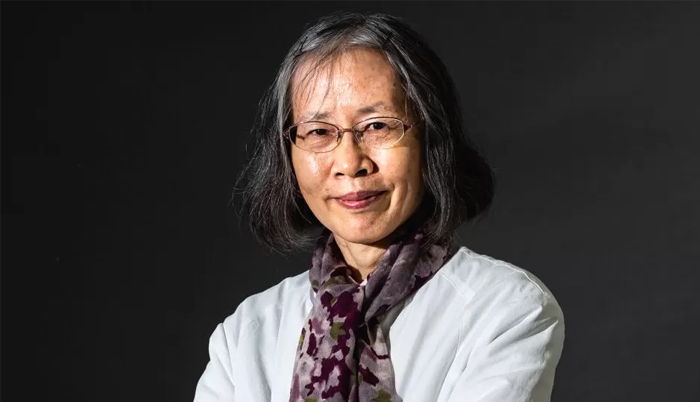![]() Home > Asia
Home > Asia
Can Xue: The Chinese Author Who Returned To Writing At 30

GETTY IMAGES | One of eight children, Can Xue was born a few years before China was plunged into its Cultural Revolution
![]() October 6th, 2023 | 00:17 AM |
October 6th, 2023 | 00:17 AM | ![]() 1361 views
1361 views
CHINA
She's a Chinese author that few in China are familiar with - and had been hotly tipped to walk away with this year's Nobel Prize in Literature.
In the end the avant-garde fiction writer didn't win - Norway's Jon Fosse did - but Can Xue's name is now much better known.
Her early life was shaped during one of the most turbulent periods of the 20th Century.
One of eight children, Can Xue was a teenager at the start of the Cultural Revolution, which plunged China into nearly a decade of chaos and bloodshed.
When the Communist purge occurred, her father - an editorial director at a newspaper - was sentenced to the countryside and forced into manual labour. Her mother, who worked for the same publication, was forced to do the same.
When her parents were taken away, she, her siblings and their grandmother were left to fend for themselves. They survived on pumpkin flowers and weeds picked from the mountains. At one point, they resorted to eating Can Xue's father's old clothes, including a fur coat. Her grandmother, who fell ill from overwork and starvation, later died of an oedema.
Can Xue was unable to continue her education, graduating only from elementary school. It was not until she was almost 30 that she began to write again.
A confluence of East and West
Can Xue, the pen name of Deng Xiaohua, was born in 1953 in Hunan province.
Growing up, she was surrounded by philosophy books owned by her father, who used to study Marxism.
But that all changed when the Cultural Revolution happened - a campaign launched by then-leader Mao Zedong to remove capitalist, traditional and cultural elements that were seen as anti-communist from society.
Her parents were among millions persecuted in a wide range of abuses carried out across the country, including public humiliation, arbitrary imprisonment, torture and seizure of property.
The man who documented China's cultural revolution
The Cultural Revolution: A memory avoided
This meant any opportunity of formal education was taken away from her. But she retained her love of reading and writing. She taught herself English and began reading Western literature extensively as she worked various jobs. She was a teacher, a self-employer tailor and even a "barefoot doctor" - an unlicensed village doctor in China.
It wasn't until the 1980s that she began writing and developing her avant-garde style that has set her apart from other Chinese authors - and largely kept her away from fame.
"[Her] style [puts off] many readers, but also makes Can Xue unique," said Chen Xiaozhen, an editor at her publisher Hunan Wenyi, in a report in the South China Morning Post.
Today, she has hundreds of novels, novellas and short stories published, with several having been translated into English.
In 2015, her novel The Last Lover won the Best Translated Book Award for fiction. She was also previously longlisted for the International Booker prize for her novel Love in the New Millennium.
She names prominent Western writers like Kafka, Tolstoy, Shakespeare and Dante as major influences in her work.
"My ideas grow up in the West but I dig them up to replant in China's deep soil, a rich history of 5,000 years," she said, according to an article by state-run website, the China Internet Information Centre.
"My works aren't like those from the West or from China, but rather my own creation. Chinese culture is from my heart. I was born here. I live here. I don't need to learn what is from my heart."
If she'd won, Can Xue would have been only the second Chinese person to walk away with a Nobel Prize in Literature, after novelist Mo Yan won the prize in 2012.
Her competitors included heavyweights far better known in the West - among them Margaret Atwood, Haruki Murakami and Salman Rushdie - but Can Xue had been one of the bookies' favourites this year.
The awards committee said the prize is awarded to "the person who shall have produced in the field of literature the most outstanding work in an ideal direction", and the winner receives 11m Swedish kronor ($999,399; £822,000).
China's literary atmosphere
When asked what she thinks of China's literary scene - Can Xue has had less than positive things to say.
"I've said it before, I have no hope," she told Chinese news outlet Sixth Tone in a 2016 interview. "[In China] everyone is only conserving the old. If you're not going back to tradition with them, then you're the outlier, which means you're marginalised and ignored."
But Can Xue, who lives in Beijing, said she would continue writing for the country's young people.
"There are very few progressive Chinese people right now, so I pin my hopes on the young. They are in their 20s now," she said.
"In another 20 years, when they encounter problems spiritually, or when materialism cannot meet their needs, they might pick up one of my books."
Source:
courtesy of BBC NEWS
by Yvette Tan | BBC News, Singapore
If you have any stories or news that you would like to share with the global online community, please feel free to share it with us by contacting us directly at [email protected]